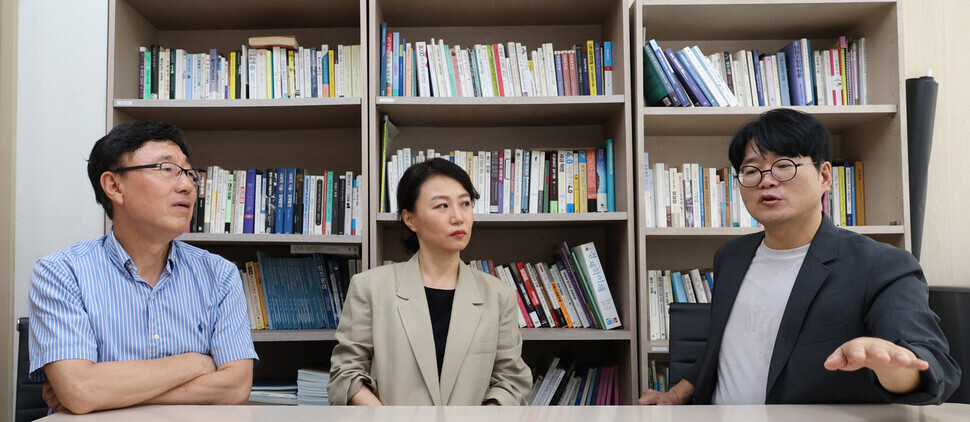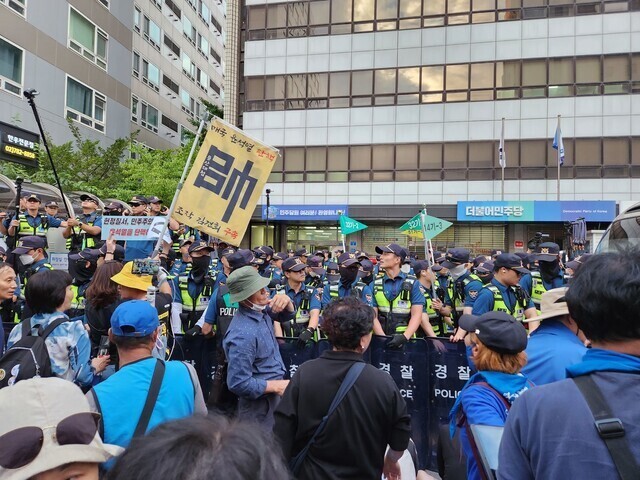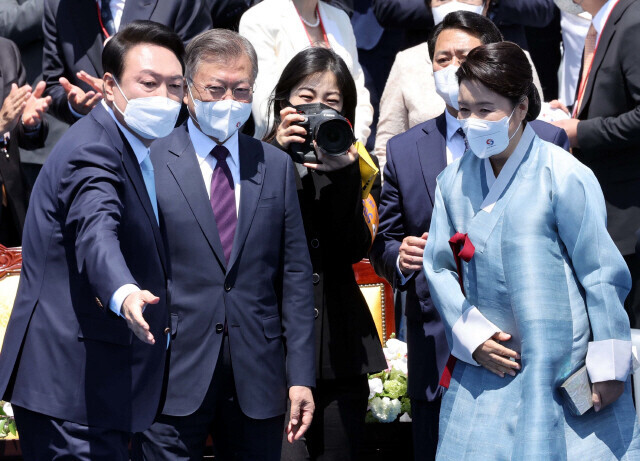hankyoreh
Links to other country sites 다른 나라 사이트 링크
Lacking real guiding philosophies, Korean politics has descended into hollow factionalism

Editor’s note: The leader of South Korea’s main opposition party went on a hunger strike, a motion consenting to his arrest was passed by the National Assembly, which led to a protest by his supporters, and a warrant for his arrest was requested and then subsequently rejected. The intense political confrontation currently unfolding in Korea is not unusual, however. Even in the United States, which has long portrayed itself as a bastion of democracy, the Capitol was overtaken by rioters three years ago, and a former president is now under indictment. We are witnessing the rise of a climate where political opponents are increasingly seen as “enemies.” This crisis of democracy, intertwined with challenges like a struggle for global hegemony, wars, and inflation, is exacerbating public unease. In light of these developments, the Hankyoreh is publishing a series of articles in anticipation of the Asia Future Forum. The pieces in this series will delve into the root causes of these crises and explore potential solutions, in line with the forum’s theme: “The Age of the Polycrisis: A Way to Coexistence.”
When politics is used not as a means of solving problems but as a way to exploit the despair and rage of disenfranchised individuals, it exacerbates political polarization. That’s at the root of the democratic crisis witnessed in many countries, including the US and Korea.
On Sept. 19, three academics sat down together at the Hankyoreh Economy and Society Research Institute to discuss what’s behind this problem and what can be done to find a modus vivendi. The three scholars in the conversation were Cho Eun-ju, an associate professor at Jeonbuk National University; Kim Man-kwon, a research professor at Kyung Hee University; and Park Sang-hoon, a visiting analyst at the National Assembly Futures Institute.
Cho Eun-ju: Talking about Korean society and politics tends to make people feel sad and upset. That’s because of the assumption that our society is getting worse or the expectation that it won’t get better.
Park Sang-hoon:We need to look into the possibility that politics is what’s angering and enraging people.
Kim Man-kwon:10.7% of Koreans are dealing with severe depression (according to a 2019 study by Seoul National University professor Yu Myeong-sun). That’s true of just 2.5% of Germans. Higher levels of depression are correlated with being young, living alone, having an irregular job, and having a lower income. The feeling comes from frustration with the disconnect between how one thinks the world ought to be and how it actually is. It comes from the feeling that the government and society aren’t looking out for you.
Park: Inequality has increased so quickly since Korea’s democratization. There’s also a huge gap in contentment between classes. The political parties don’t even bother campaigning to elderly people and people living alone because they tend not to vote or even pay taxes. There’s hardly anyone to speak for those people. Irregular workers have to deal with feelings of social exclusion every two years (during the collective bargaining period). Feelings of frustration are very high in those groups.
Kim: Democratization has also coincided with a period of forming a global market order in tandem with advancements in digital technology. There’s been a growing divide between the people who are and are not capable of taking advantage of it. This reality of everyone having to respond for themselves has led to anger, inequality, and a loss of trust in the state and society.
Cho: In the past, there was the belief that the situation could be made better through collective, organized processes such as political or labor union activities and social movements. Now even that hope has fallen by the wayside.

Park: In Korea, there’s a low rate of participation in “associations.” We haven’t developed the kind of structures of association that would allow society to resolve things independently. Instead, we’ve taken on characteristics of a state-centered society. If we developed more of a system of associations, we’d be able to resolve conflicts through other means and achieve coordination and cooperation between parties. Since that isn’t an option, people feel like they have to go into the streets.
Kim: We’re a state-reliant society, but not a society where people are protected. This bears connections with meritocracy, which broadly supports inequality. The kind of phenomenon you see in a society where there is little belief that politics or systems will protect you is a fixation on life insurance and real estate as if they were some last line of defense.
Cho: The lively proliferation of movements in post-democratization Korea has not translated into associations. No attempts were made to interpret the factors in the rage and anger that’s being expressed and turn them into political agendas. In the most recent presidential election, “men in their 20s” and “young people” were keywords, but rage remained simply a way of proving oneself in male-dominated online communities. Politics merely capitalized on those feelings, and there have been no improvements in youth policies at all.
Kim: Low levels of association are also linked to disdain toward labor. Because of low unionization rates, the 10%-15% of people who join unions have suddenly become a “privileged group.” When these people go out to fight for their rights, politicians attack the unions by calling them “spoiled,” which the public then believes. By attacking unionized workers, the politicians shift the blame they should be receiving onto others.
Park: South Korea is a strong state in terms of disciplinary power, but proves to be pretty powerless when it comes to reorganizing the structure of society in terms of people’s professions and their incomes through various social policies. What governs individuals is the market mechanism of meritocracy. Politics is about changing the economic life of society or individuals through government, but as of now, all the focus seems to be on who “owns” the country.
Cho: Korean society has too little real ideological conflict. That is to say, factional conflicts are too prominent. No one talks about which direction South Korean society should be heading, and only talk about what they like or dislike.
Park: There have never been any major ideological debates in our two-party system. Everything has remained pretty much the same. Politics revolves around fights between the previous president and the current president, and arguments about who will be the next president. Fights over the ownership of supreme power without ideology will only create divisions everywhere.
Kim: The terms “pro-Japan” or “pro-Pyongyang” do not signify ideologies, but are terms that define factional oppositions. The experience of colonization and partition, combined with other polarizing factors, can easily divide a society.
Park: What the opposing parties call ideological conflict may be better termed “anti-ideology,” as they have become factors that are mobilized to justify the hatred of their counterpart. It is a shame that political factions are not named “welfare” factions or “growth” factions, but “pro-Moon Jae-in,” “pro-Lee Jae-myung,” and so on, based on who they are friendly with. Communist totalitarianism [a neologism coined by President Yoon] is a dramatic example of how fictitious ideological conflicts are. They’re about creating imaginary enemies to fight.
Kim: There is no right and left in our politics, but a right and far right. In our two-party system, there is no culture of mutual recognition of the other party as a legitimate competitor, and there is no restraint in exercising institutional rights carefully.

Park: Who knows what the two parties are arguing about. Each of them acts like a ruling party when they’re the ruling party and acts like an opposition party when they’re the opposition party. The Democratic Party is active on labor issues now, but wasn’t when it was in power. The problem lies in the fact that the two biggest parties antagonize each other, not in the two-party system itself.
Cho: When it comes to institutional interventions to mitigate rising inequality, both parties are very weak. During the COVID-19 pandemic, the economic relief that South Korea provided to the public was among the lowest in the world. South Korea’s market ideology combined with nationalism is creating problems.
Park: Politicians talk big game about welfare, but the majority of bills that are introduced in the National Assembly are those proposing tax cuts.
Cho: The two main efforts by the state to reduce inequality are taxes and unions. South Korea is doing abysmally in both. In a world without protection provided by the state, the only way to protect yourself is to maximize profits. People who are unable to keep up with the competition are labeled “lazy” or told they haven’t made enough effort. They are hated and despised. Meritocracy is always transformed into a system that judges the “efforts” of others.
Park: The rise of Trump blew the top off the discontent of the American underclass. But polarization in South Korea? Social media is full of educated, middle-class people.
Cho: South Korea’s political polarization is worse than the rise of Trump. When it came to Trump, there was a group that he spoke for with every word. He worked by tapping into the group’s emotions and translating them into political support and organizing them politically in some form. If you look at that as a positive aspect of populism, we don’t have that in South Korea.
Park: Even in American politics, there are certain guardrails for the two-party system to work. Korea has them too. The National Assembly used to be more ashamed of breaking precedent or norms than breaking the law. But that’s no longer the case. Now, everyone wants to stick strictly to the letter of the law. Before that, they tried to solve problems through negotiation, and now we have a structure where politicians are judged by their supporters by who can spout the most vitriol at their opponents. It would be nice to be judged not on how well a representative fought, but on how well they argued meaningfully while maintaining the norms.
Knowing when to criticize your own party is also necessary. The Democratic faction, at least, needs to self-reflect. The lack of such reflection amplifies factionalism. In the US, the Republican Party was the one that brought on polarization, but in South Korea, it’s the Democratic Party that holds the key.
Cho: We need to look at the conflict in the long term, beyond the structure of fighting a major evil. We need to ask why the politics of anger, resentment, and antagonism have amplified since the candlelight protests, and what those rallies left for us.
Kim: The more divided a society is, the more it relies on intuitive understanding and emotional bases to solve problems. As political parties split into factions, conflict structures expanded and a sense of common ground disappeared.
After South Korea’s democratization, conservatives were never so headstrong. Previously, conservatives always had political experience, but the recent crop of conservatives have no political experience. They do not follow political norms, and merely base their actions off their own personal experiences.
Park: The Democratic Party is not the Democratic Party of the past, and the PPP is not the conservative party of the past. Conservatives were formerly characterized by a solid organizational foundation and dignity. But conservatives have lost that, and have become overrun by outside forces. The same goes for the Democrats.
Park formerly served as the dean of Power Plant, an organization dedicated to education and research. Cho’s forte is in social change and inequality and is the author of “Family and Governance.” Kim is a political philosopher and the author of “Homo Justice.”
By Ryu Yi-geun, senior staff writer at Hankyoreh Economy and Society Research Institute; Ro Young-joon, research assistant
Please direct questions or comments to [english@hani.co.kr]

Editorial・opinion
![[Editorial] Intensifying US-China rivalry means Seoul must address uncertainty with Beijing sooner than later [Editorial] Intensifying US-China rivalry means Seoul must address uncertainty with Beijing sooner than later](https://flexible.img.hani.co.kr/flexible/normal/500/300/imgdb/original/2024/0517/8117159322045222.jpg) [Editorial] Intensifying US-China rivalry means Seoul must address uncertainty with Beijing sooner than later
[Editorial] Intensifying US-China rivalry means Seoul must address uncertainty with Beijing sooner than later![[Column] When ‘fairness’ means hate and violence [Column] When ‘fairness’ means hate and violence](https://flexible.img.hani.co.kr/flexible/normal/500/300/imgdb/original/2024/0516/7417158465908824.jpg) [Column] When ‘fairness’ means hate and violence
[Column] When ‘fairness’ means hate and violence- [Editorial] Yoon must stop abusing authority to shield himself from investigation
- [Column] US troop withdrawal from Korea could be the Acheson Line all over
- [Column] How to win back readers who’ve turned to YouTube for news
- [Column] Welcome to the president’s pity party
- [Editorial] Korea must respond firmly to Japan’s attempt to usurp Line
- [Editorial] Transfers of prosecutors investigating Korea’s first lady send chilling message
- [Column] Will Seoul’s ties with Moscow really recover on their own?
- [Column] Samsung’s ‘lost decade’ and Lee Jae-yong’s mismatched chopsticks
Most viewed articles
- 1[Editorial] Transfers of prosecutors investigating Korea’s first lady send chilling message
- 2For new generation of Chinese artists, discontent is disobedience
- 3S. Korea “monitoring developments” after report of secret Chinese police station in Seoul
- 4Xi, Putin ‘oppose acts of military intimidation’ against N. Korea by US in joint statement
- 5[Exclusive] Unearthed memo suggests Gwangju Uprising missing may have been cremated
- 6N. Korean media upgrades epithet for leader’s daughter from “beloved” to “respected”
- 7Yoon says concern about biased diplomacy is being incited by “communist totalitarian forces”
- 8[Editorial] Intensifying US-China rivalry means Seoul must address uncertainty with Beijing sooner t
- 9[Column] Samsung’s ‘lost decade’ and Lee Jae-yong’s mismatched chopsticks
- 10[Special reportage- part I] Elderly prostitution at Jongmyo Park